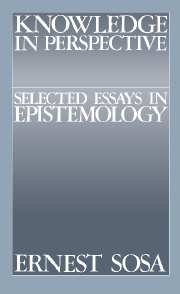Book contents
- Frontmatter
- Contents
- Sources and acknowledgments
- Introduction: back to basics
- PART I WHAT IS KNOWLEDGE, AND HOW IS IT POSSIBLE?
- 1 The analysis of “knowledge that p”
- 2 How do you know?
- 3 On our knowledge of matters of fact
- 4 Presuppositions of empirical knowledge
- PART II THEORIES OF JUSTIFICATION
- PART III INTELLECTUAL VIRTUE AND EPISTEMIC PERSPECTIVE: A VIEW PRESENTED
- PART IV INTELLECTUAL VIRTUE IN PERSPECTIVE: THE VIEW DEVELOPED
- Index
- Frontmatter
- Contents
- Sources and acknowledgments
- Introduction: back to basics
- PART I WHAT IS KNOWLEDGE, AND HOW IS IT POSSIBLE?
- 1 The analysis of “knowledge that p”
- 2 How do you know?
- 3 On our knowledge of matters of fact
- 4 Presuppositions of empirical knowledge
- PART II THEORIES OF JUSTIFICATION
- PART III INTELLECTUAL VIRTUE AND EPISTEMIC PERSPECTIVE: A VIEW PRESENTED
- PART IV INTELLECTUAL VIRTUE IN PERSPECTIVE: THE VIEW DEVELOPED
- Index
Summary
Despair of knowing what knowledge is dates back to Plato's Theaetetus. Most recently, the trinitarian view of knowledge as justified true belief has been refuted, and a multitude of problems has appeared. Progress on this question is perhaps fated to be asymptotic. But such progress as can now be made depends, in my opinion, on a careful study of the conditions within which a correctly believed proposition is a bit of knowledge. In what follows I hope to enhance our knowledge of knowledge by contributing to such a study.
An accepted truth is knowledge only if evident. What then is it for something to be evident? One short answer is this: a proposition is evident to someone provided he is (theoretically) justified in believing it. But under what further circumstances is the truth of a proposition evident to someone? This is our first main question.
To begin with, there are two general situations where it is evident to someone S that p. First, there is the situation where it is self-evident to S that p, i.e., where from the fact that S correctly believes that p we may infer that it is evident to S that p. Our inference here cannot be logically valid as it stands, however, since logic alone will not enable us to infer that anything is evident just from the fact that it is correctly believed.
- Type
- Chapter
- Information
- Knowledge in PerspectiveSelected Essays in Epistemology, pp. 19 - 34Publisher: Cambridge University PressPrint publication year: 1991



